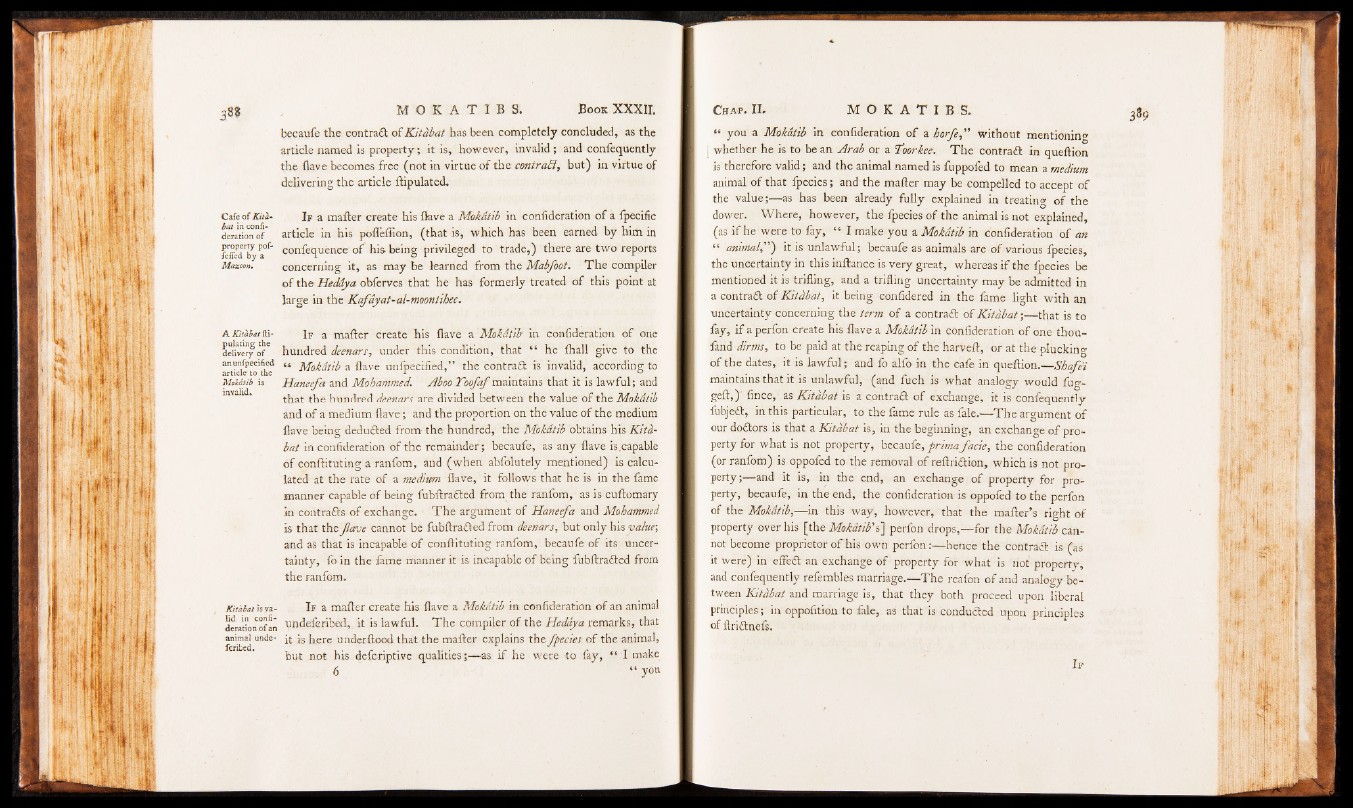
Cafe o f Kitabat
in. confi-
deration o f
property pof-
fefied by a
Mazoon,
A Kitahat fti-
pulating the
delivery of
anunfpecified
article to the
Mokdtib is
invalid»
Kitahat is valid
in confi-
deration o f an
animal unde'
fcribed.
becaufe the contrail of Kitahat has been completely concluded, as the
article named is property; it is, however, invalid; and confequently
the Have becomes free (not in virtue of the contract, but) in virtue of
delivering the article ftipulated.
If a matter create his Have a Mokatib in confideration of a fpecific
article in his pofleffion, (that is, which has been earned by him in
confequence o f his being privileged to trade,) there are two reports
concerning it, as may be learned from the Mabfoot. The compiler
of the- Heddya obferves that he has formerly treated of this point at
large in the Kafayat-al-moontihee.
If a matter create his Have a Mokdtib in confideration of one
hundred deenars, under this condition, that “ he {hall give to the
“ Mokdtib a {lave unfpecified,” the contradl is invalid, according to
Haneefa and Mohammed. Aboo Toofaf maintains that it is lawful; and
that the hundred deenars are divided between the value of the Mokdtib
and of a medium flave; and the proportion on the value of the medium
Have being deducted from the hundred, the Mokdtib obtains his Kitabat
in confideration of the remainder; becaufe, as any flave is,capable
of conftituting a ranfom, and (when abfolutely mentioned) is calculated
at the rate of a mediwn flave, it follows that he is in the fame
manner capable of being fubftradted from the ranfom, as is cuftomary
in contrafts of exchange. The argument of Haneefa and Mohammed
is that the flave cannot be fubftradted from deenars, but only his value-,
and as that is incapable of conftituting ranfom, becaufe of its uncertainty,
fo in the fame manner it is incapable of being fubftradted from
the ranfom.
If a matter create his flave a Mokdtib in confideration of an animal
undeferibed, it is lawful. The compiler of the Heddya remarks, that
it is here underftood that the matter explains the fpecies of the animal,
but not his defcriptive qualities;—as if he were to fay, “ I make
6 “ you
“ you a Mokdtib in confideration of a horfe, ” without mentioning
j whether he is to be an Arab or a foorkee. The contract in queftion
is therefore valid; and the animal named is fuppoled to mean a medium
animal of that fpecies; and the matter may be compelled to accept of
the value;— as has been already fully explained in treating of the
dower. Where, however, the Ipecies of the animal is not explained,
(as if he were to fay, “ I make you a Mokdtib in confideration of an
“ animal,'’") it is unlawful; becaufe as animals are o f various fpecies,
the uncertainty in this inftance is very great, whereas i f the fpecies be
mentioned it is trifling, and a trifling uncertainty may be admitted in
a contradl of Kitabat, it being confidered in the fame light with an
uncertainty concerning the term of a contrail o f Kitabat;— that is to
fay, i f a perfon create his flave a Mokdtib in confideration of one thou-
fand dir ms, to be paid at the reaping of the harveft, or at the plucking
o f the dates, it is lawful; and fo alfo in the cafe in queftion.— Shafei
maintains that it is unlawful, (and fuch is what analogy would fudged,)'
fince, as Kitabat is a contrail of exchange, it is confequently
fubjedt, in this particular, to the fame rule as fale.— The argument of
our dodtors is that a Kitabat is, in the beginning, an exchange o f property
for what is not property, becaufe, prima fa cie, the confideration
(or ranfom) is oppofed to the removal o f reftriction, which is not property;—
and it is, in the end, an exchange of property for property,
becaufe, in the end, the confideration is oppofed to the perfon
of the Mokdtib,— in this way, however, that the matter’ s right of
property over his [the Mokdtib's] perfon drops,— for the Mokdtib cannot
become proprietor o f his own perfon:— hence the contradl is (aS
it were) in effedl an exchange of property for what is not property,
and confequently refembles marriage— The reafon of and analogy between
Kitabat and marriage is, that they both proceed upon liberal
principles; in oppofition to fale, as that is condudled upon principles
of ftridtnefs.
I f